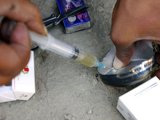Today.Az » Weird / Interesting » Study says: 10 million illegal drug users have hepatitis C
28 July 2011 [16:20] - Today.Az
 Some 10 million people who inject illegal drugs have hepatitis C while 1.2 million have hepatitis B, according to the first global estimate of infection rates among this population, published Thursday.
Some 10 million people who inject illegal drugs have hepatitis C while 1.2 million have hepatitis B, according to the first global estimate of infection rates among this population, published Thursday.
Both viral diseases are debilitating and potentially deadly, and public health officials must step up efforts to combat blood-borne transmission and to lower treatment costs, the researchers urged.
The health and economic costs of hepatitis C (HCV) spread via injected drugs, on its own, may be as high or higher than for similarly transmitted cases of HIV, they said.
The study, published in the British journal The Lancet, found that fully two-thirds of the global population of "injecting drug users" have been exposed, and thus infected, to HVC.
About 80 percent are destined to develop chronic infections, and up to 11 percent of these individuals will, within two decades, suffer cirrhosis, which can cause liver failure and cancer.
There is currently no vaccine for the hepatitis C virus.
The portion of drug users with HCV -- inferred from the presence of hepatitis C antibody -- varied among the 77 countries from which data was collected.
The rate was 60 to 80 percent in 25 nations, including Spain (80 percent), Norway (76), Germany (75), France (74), the United States (73), China (67) and Canada (64).
In 12 countries, the percentage was higher than 80, including Italy, Portugal, Pakistan, The Netherlands, Thailand and Mexico, which had a 97 percent infection rate among mainlining drug users.
The United Kingdom, New Zealand and Australia had among the lowest percentage, just over half.
Hepatitis B virus (HBV) can be transmitted intravenously, as well as via sexual contact, and from mother to child.
There are 350 million people chronically infected worldwide, almost all of them exposed to the virus as children. "This is why universal infant vaccination against hepatitis B is so crucial to long term control of the virus," the authors note.
HBV is the second most important known human cancer-causing agent, after tobacco. The virus also causes cirrhosis and liver cancer, and is blamed for some 600,000 deaths each year, according to the World Health Organisation.
The study, led by Louisa Degenhardt of the Bernet Institute in Melbourne and Paul Nelson of the University of New South Wales, also in Australia, canvassed data from 59 countries on HBV rates among drug users who use needles.
Infection rates were five to 10 percent in 21 countries, and more than 10 percent in 10 countries, including the United States (12 percent).
Worldwide, the highest rates were in Vietnam (20 percent), Estonia (19), Saudi Arabia (18) and Taiwan (17).
The authors said high prices for medicine remains a major barrier to treatment of viral hepatitis, much as they have been in the past for HIV and AIDS.
"There are growing efforts to bring viral hepatitis treatments into the same lower cost access framework as antiretrovirals," they said, referring to the standard drugs used to hold HIV in check.
"But the significance of viral hepatitis needs to receive great attention than it does at present."
July 28 is World Hepatitis Day.
/Yahoo News/
|
|